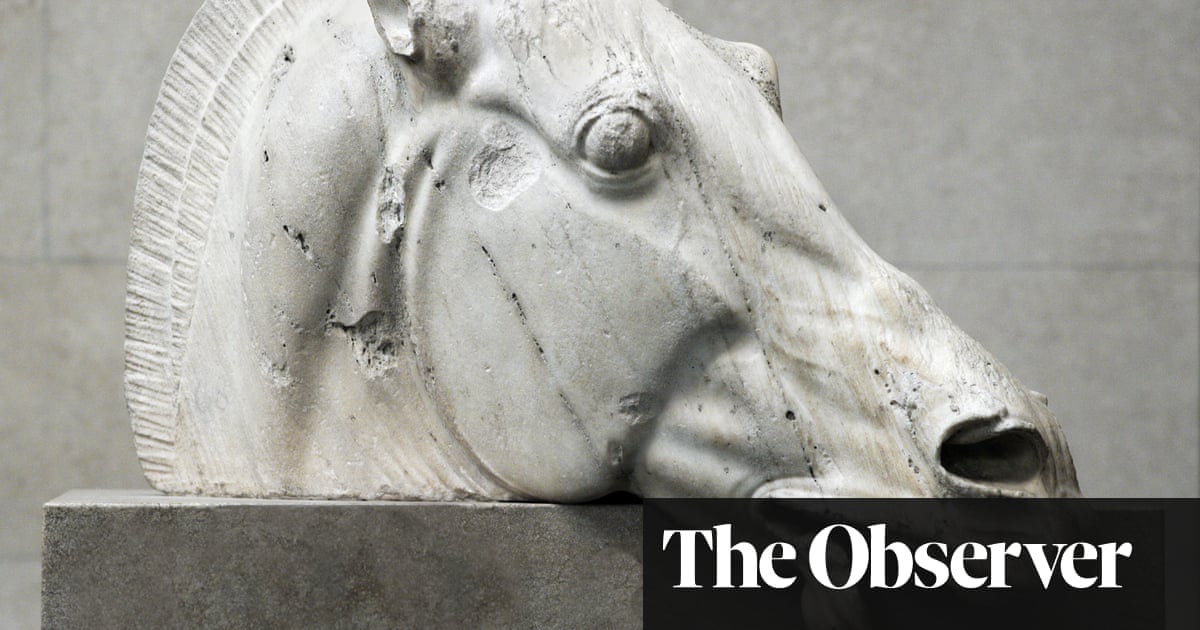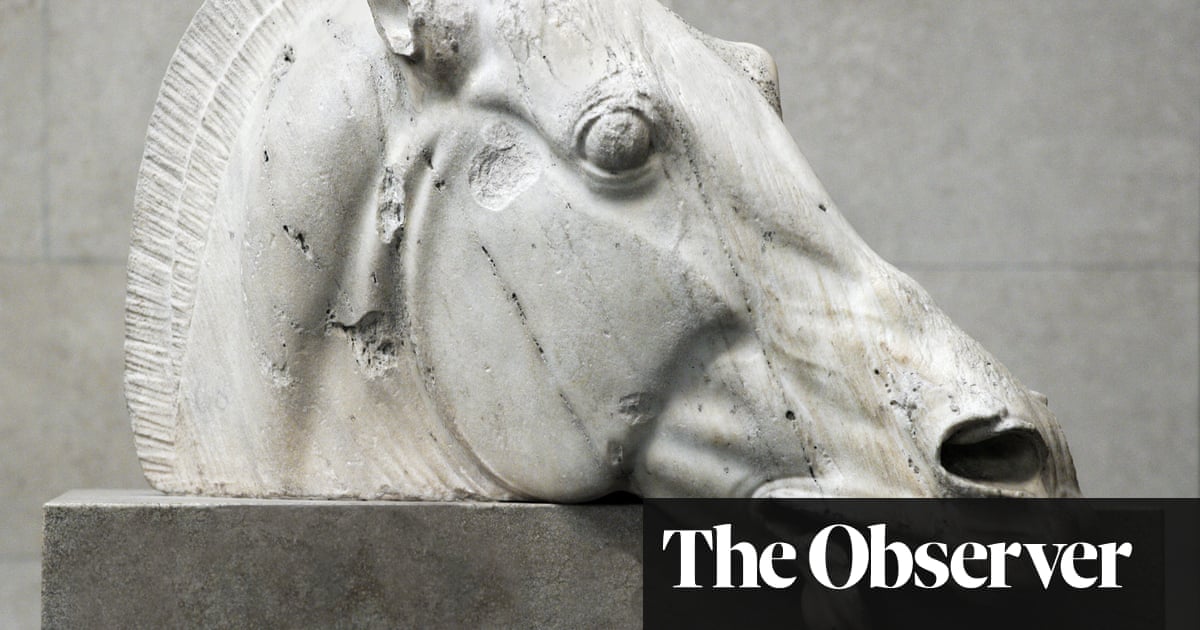Prime minister Kyriakos Mitsotakis makes pitch for pragmatic deal to end historic battle over Elgin treasures

To Greeces delight, a bust of Pericles now graces 10 Downing Street. Within hours of assuming office as prime minister, Boris Johnson had placed a plaster likeness of the Athenian soldier-statesman, whom he has long admired, on his desk. Johnsons knowledge of the ancient world he studied classics at Oxford and once boasted that he could recite the first 100 lines of Homers Iliad is regarded with awe in modern Greece.
But that affinity will soon be tested in the run-up to Greeces bicentennial independence celebrations, when Athens steps up its campaign to win back from the British Museum the Parthenon sculptures that once adorned Pericless masterpiece.
Speaking to a British newspaper for the first time since his election in July, the Greek prime minister, Kyriakos Mitsotakis, has told the Observer he is willing to allow treasures that have never been shown abroad before to be exhibited in London in exchange for the marbles being returned to Athens for 2021.
Our wish and ambition is to create the necessary conditions for Greek cultural heritage to travel the world and in so doing convey the great and essential contribution of our country to western civilisation, he said in his office last week. In this context, given the significance of 2021, I will propose to Boris: As a first move, loan me the sculptures for a certain period of time and I will send you very important artefacts that have never left Greece to be exhibited in the British Museum.
As Athens emerges from a decade of bruising austerity, battling bankruptcy on the frontline of the eurozone crisis, this will be the first such proposal put to London in years.
The Acropolis doesnt necessarily solely belong to Greece, added Mitsotakis. Its a monument of global cultural heritage. But if you really want to see the monument in its unity you have to see what we call the Parthenon sculptures in situ its a question of uniting the monument.
It is remarkable how much of the 160m-long Parthenon frieze the first artwork depicting deities alongside human figures has survived, but it is highly fragmented. While 50 metres of the 115-block frieze is displayed in Athens, some 80 metres of it is in London, having being sawn off and removed by Lord Elgin, Londons then ambassador to the Ottoman empire, in 1802. Eight other museums scattered across Europe also house pieces of it.
Since repatriation was first raised by the actress-turned-politician Melina Mercouri in the 1980s, the British Museum has persistently rebuffed requests for the priceless antiquities to be sent back to Greece. But in several surveys, Britons have voiced support for the Greek cause. A YouGov poll conducted in 2014 revealed that only 23% wanted the antiquities to remain in the UK.

Of course our demand for the return of the sculptures remains in place, said Mitsotakis. I dont think [Britain] should be fighting a losing battle. Eventually this is going to be a losing battle. At the end of the day there is going to be mounting pressure on this issue.
Mitsotakis, 51, who assumed power two weeks before Johnson, was not expected to address this issue so early on. The Harvard-educated banker, whose background as the scion of a political dynasty is as privileged as Johnsons, does not, seemingly at least, relish a fight. But in politics timing is everything. And, says Mitsotakis, with events being lined up for the bicentennial,the timing is excellent.
Last week in a move that will almost certainly embarrass Britain France responded with unexpected enthusiasm to the suggestion that it, too, return part of the frieze to Greece. The classical carving, regarded by the Louvre as the most precious in its possession, depicts a centaur battling a burly Lapith woman, who in the struggle attempts to hold on to a peplos, or cloak, that has slipped from her shoulder.
The woman is portrayed with her breasts and left leg exposed highlighting the humanity and artistry of Phidias, the master sculptor commissioned by Pericles to decorate the temple.
Mitsotakis made the request during talks with President Emmanuel Macron on his first official visit to Paris. To the delight of the Greek delegation the response was overwhelmingly positive: the French promised to look into returning the priceless objects in return for the loan of unseen Greek bronzes to the Louvre. As part of the concept of [promoting] our common European culture, there needs to be more fluidity and more movement, Mitsotakis said. If it happens, and I think it will happen, its going to be a first small crack.
Earlier this year there was renewed rancour over the Parthenon marbles when the British Museums director, Hartwig Fischer, dismissing any suggestion of their return to Athens, described the sculptures arrival in Britain as a creative act.
Like the British Museums marbles, there are parallels in how Paris also came to acquire fragments from the Parthenon almost three decades before the Greeks, seeking to break away from Ottoman sovereignty, launched what would ultimately be a glorious, if blood-soaked, war for Independence.
Setting the precedent for Elgin, Frances own ambassador to Constantinople, years earlier, ordered the collection of as many sculptures as possible a task entrusted to Louis Fauvel, Frances avaricious consul, who oversaw excavations at the Acropolis in 1788. Following Frances defeat in Egypt by the British navy a decade later, Elgin began the campaign to amass his own collection, instructing his agent on the ground to pack the sculptures in a separate case in such manner that they not be recognised by the curious.
The artworks were then carted by warship to Britain before a bankrupt Elgin was forced to sell them to the British Museum in 1816.

Athens says it no longer wants to dwell on the circumstances of how the marbles were removed circumstances that have remained controversial and have focused on whether Elgin was ever furnished with a permit, from the Ottoman authorities to take as much as he did.
Instead, the new Greek government says it wants to focus on exchange. There are 21,000 known archaeological sites in Greece, said the culture minister, Lina Mendoni, a classical archaeologist. We have 10 times more than we can possibly exhibit. Almost every day something valuable is found. We want to export these cultural assets.
Nor does Athens want to focus on Brexit and whether London should do the decent thing and hand back the relics now that it is set to leave the EU, as some campaigners argue.
This will not be Johnsons first brush with the issue. As head of the Oxford Union, he invited Mercouri to debate the issue in Britain in 1986. The minister and the student were photographed together before she took to the stage to plead for the marbles return.


Recent Comments